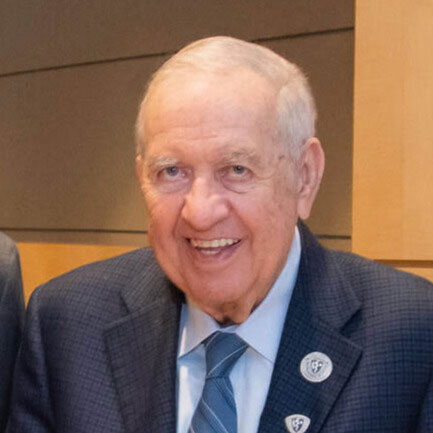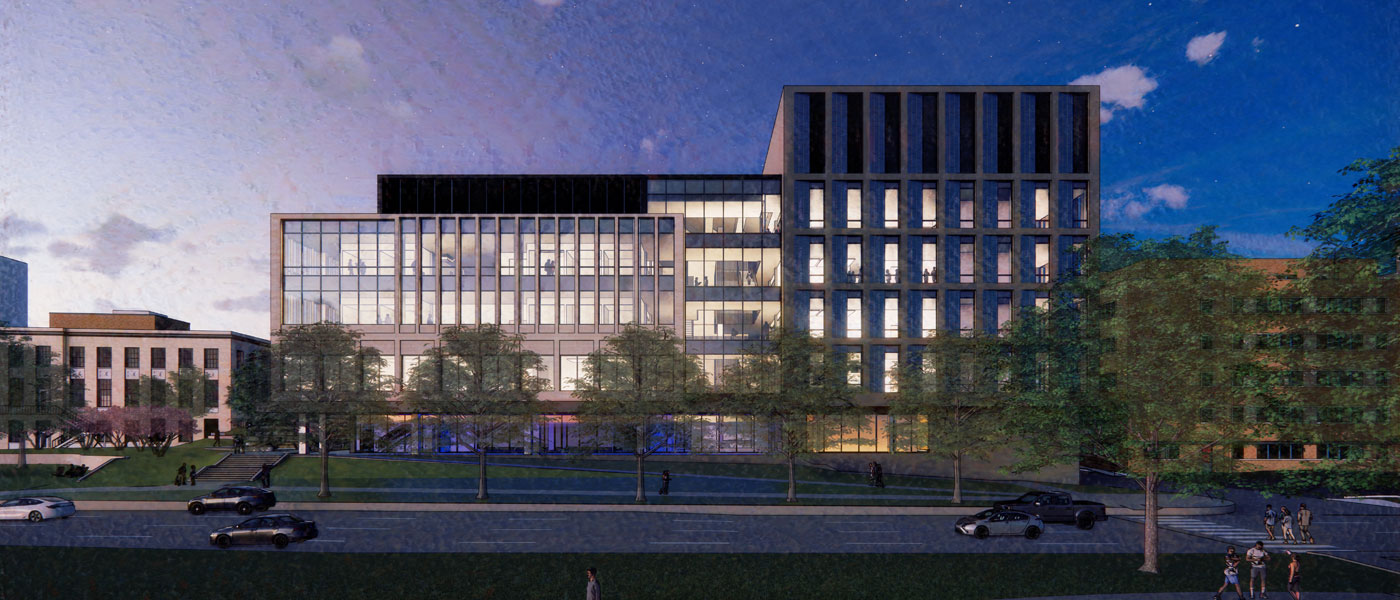When longtime Case Western Reserve benefactor and volunteer Tom Peterson died in February 2021, he granted university alumnus Robert Lustig control of his charitable trust.
In a decision that honors both Peterson’s passion for scientific innovation and Lustig’s love of his alma mater, Lustig committed $1 million from the Thomas F. Peterson Jr. Charitable Trust to the Interdisciplinary Science and Engineering Building (ISEB) on the university’s Case Quad. An additional $1 million will establish an endowed fund to support the Intellectual Property Venture Clinic at the School of Law and rename it in Peterson’s honor. The clinic will continue its work representing start-up companies and entrepreneurs, and will offer services to help protect ideas developed at the ISEB.
“Tom was something of a renaissance man, and his interests were incredibly broad across science, research, medicine and technology,” said Lustig (ADL ’57, LAW ’60). “He was very supportive of Case Western Reserve in his lifetime and, as a double alum myself, I am motivated to continue that.”

These commitments add to Peterson’s generous legacy at the university, with more than $17 million donated to projects at the School of Medicine, College of Arts and Sciences, Kelvin Smith Library and the Milton and Tamar Maltz Performing Arts Center at the Temple – Tifereth Israel.
“Tom’s support for the university has always been aligned with our mission,” said CWRU President Eric W. Kaler. “This gift honors Tom’s aspirations while advancing our research and protecting our discoveries. We are deeply grateful to Tom and to Bob, for being such enthusiastic and dedicated champions of Case Western Reserve.”
Peterson was an undergraduate at Massachusetts Institute of Technology when, in 1951, he returned home to Cleveland to help care for his father—an inventor, electrical engineer and founder of the manufacturing company Preformed Line Products Co. (PLP). When his father died in 1957, the younger Peterson was named executive vice president of PLP, but he never stopped pursuing his own interests in photography, videography and sound technology.
In 1966, he founded Motion Picture Sound Inc., which provided audio services for a variety of projects, from live heart surgeries at Cleveland Clinic to Hollywood movies, such as A Christmas Story. He would lend this expertise decades later during the renovations of the Maltz Performing Arts Center, where one of his many gifts established the Tom Peterson Sound Production Room.
Peterson was also an avid reader, and his library grew to several thousand volumes, including first editions by Galileo and Benjamin Franklin. He gave much of this rare collection to Case Western Reserve’s Kelvin Smith Library, in addition to donating antique medical devices to the university’s Dittrick Medical History Center.
Over the years, Peterson’s academic interests broadened and he began studying cancer and multiple sclerosis—both of which his late wife suffered—and worked closely with researchers at Case Western Reserve and his alma mater. He established numerous research funds at CWRU School of Medicine, as well as a professorship in cancer and energy research, and a biomedical scholars fund to support the school’s PhD and MD/PhD programs.
In the final decade of Peterson’s life, he retained Lustig’s law firm to manage his finances. The two got to know each other, establishing the trust for Lustig to carry on Peterson’s legacy.
“I agree 100% with President Kaler on the need for this building,” Lustig said of the ISEB. “Students and researchers are going where things are bright, shiny and new, and technological institutions have to keep up. This is a project I know Tom would have been excited about.”

